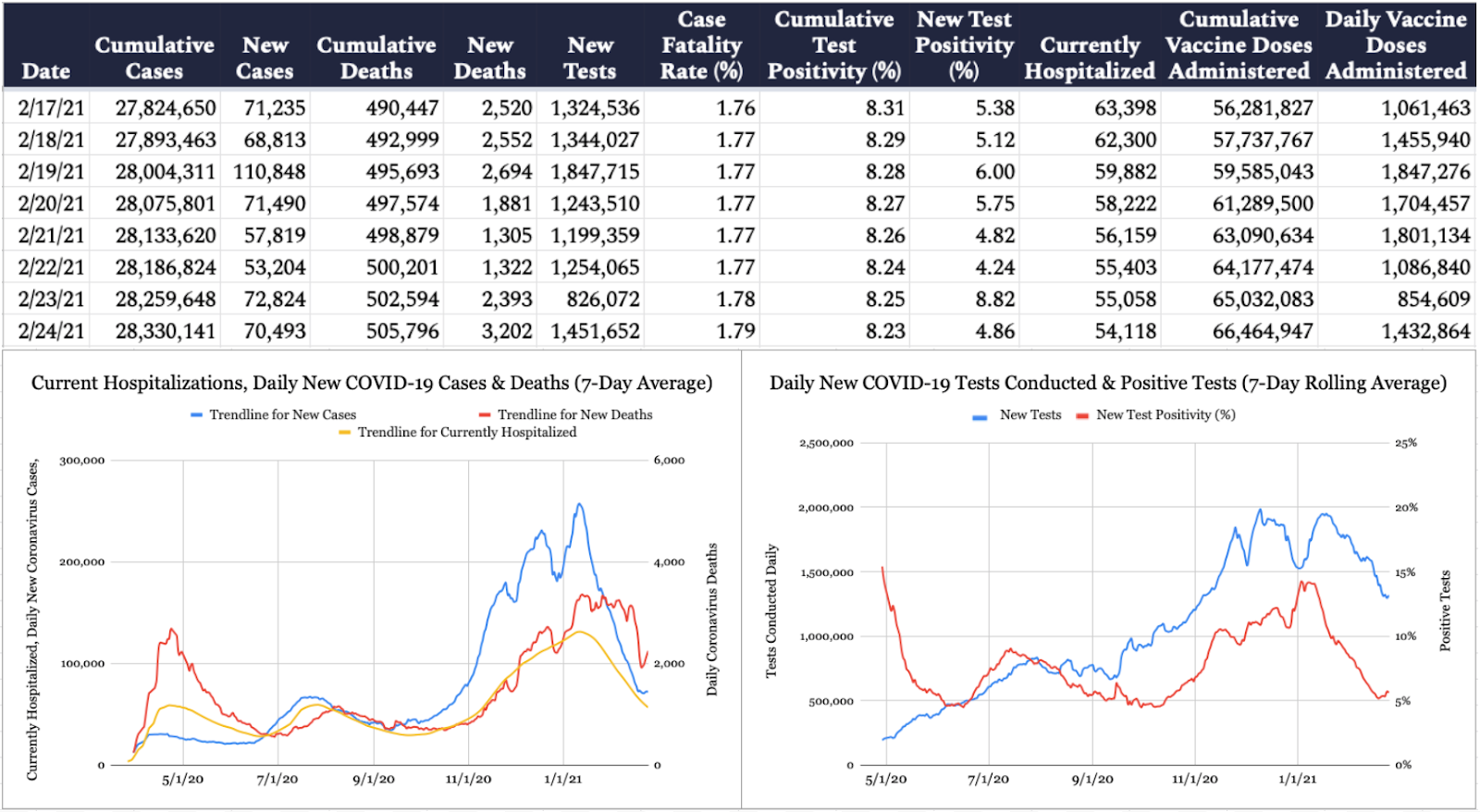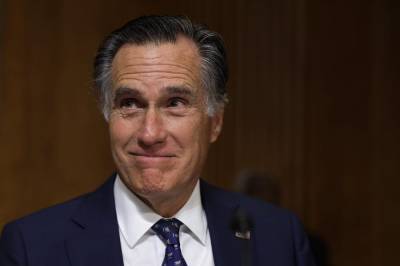Happy Thursday! We’re sorry for doubling up in your inbox this morning—your a.m. editor accidentally stuck Danielle Pletka’s interview with Wang Xiyue, an American imprisoned in Iran for 40 months, in the wrong office pneumatic tube, sending it out as an email rather than simply posting it to the site. (The interview itself is terrific, by the way—and while that’s not why we sent it, it’s well worth your time.)
Quick Hits: Today’s Top Stories
An analysis by the Food and Drug Administration found that Johnson & Johnson’s single-dose COVID-19 vaccine raised no safety concerns, was very effective at preventing severe illness and death from the virus, and likely limits transmission. The FDA could authorize the vaccine for emergency use as early as this weekend, and Johnson & Johnson has said it will have 20 million doses available by the end of March.
Neera Tanden’s path to leading the Office of Management and Budget took a further hit yesterday when two Senate committees postponed hearings surrounding her nomination. “It didn’t look like she had the votes,” Sen. Bernie Sanders said.
U.S. District Judge Drew Tipton granted a preliminary injunction on Tuesday blocking President Biden’s 100-day moratorium on most deportations. Tipton had previously instituted a 14-day restraining order preventing Biden’s order from being enforced.
President Biden signed an executive order Wednesday initiating a 100-day review of vulnerabilities in the U.S. supply chain, in part hoping to address a global semiconductor shortage affecting a range of American industries. “All this won’t just strengthen our domestic capacity, it will help unleash new markets around the world and grow opportunities for American businesses to export their goods that we’re going to be making,” the president said of the order.
A former aide to New York Gov. Andrew Cuomo alleged on Wednesday that the governor sexually harassed her while she worked in his office, accusing Cuomo of inappropriate comments and touching. His office has denied all claims, calling them “simply false.”
The United States confirmed 70,493 new cases of COVID-19 yesterday per the Johns Hopkins University COVID-19 Dashboard, with 4.9 percent of the 1,451,652 tests reported coming back positive. An additional 3,202 deaths were attributed to the virus on Wednesday, bringing the pandemic’s American death toll to 505,796. According to the COVID Tracking Project, 54,118 Americans are currently hospitalized with COVID-19. According to the Centers for Disease Control, 1,432,864 COVID-19 vaccine doses were administered yesterday, bringing the nationwide total to 66,464,947.

The GOP Counteroffers to Biden’s $15 Minimum Wage
You’ve probably never heard of Elizabeth MacDonough, but she’s one of the most powerful people in Washington this week.
Appointed to the role of Senate parliamentarian by then-Sen. Harry Reid in 2012, MacDonough is in charge of interpreting the rules of Congress’s upper chamber and enforcing parliamentary procedure. Any day now, she will issue a ruling as to whether Democrats can use the budget reconciliation process—which requires only 50 votes (plus Vice President Kamala Harris as a tiebreaker)—to raise the federal minimum wage to $15 per hour by 2025 as part of their $1.9 trillion coronavirus relief package.
Democrats could technically overrule MacDonough if she comes down against them, but the White House has pledged not to do so. “That’s not something we would do,” Ron Klain, President Biden’s chief of staff, told MSNBC last night. “We’re going to honor the rules of the Senate and work within that system to get this bill passed.”
“The only way that we are going to raise the minimum wage is through reconciliation or ending the filibuster,” Sen. Bernie Sanders said yesterday. It’s not clear a nationwide $15 minimum wage would pass the Senate in either circumstance—Democratic Sens. Joe Manchin and Kyrsten Sinema have hinted they won’t support it—but there is a third path, even if it’s the one less traveled nowadays: Bipartisan compromise.
To that end, a handful of Republicans have introduced proposals this week addressing the federal minimum wage, which has sat at $7.25 per hour since July 2009 (though about three in five states currently have minimum wages above that threshold).
A plan from Sens. Mitt Romney and Tom Cotton would pair a gradual wage hike with a mandate that all employers use E-Verify—a Department of Homeland Security tool designed to confirm employment eligibility—to prevent the hiring of undocumented workers. A competing framework from Sen. Josh Hawley would provide low-wage workers with quarterly refundable tax credits in an effort to lessen the burden on small businesses.
Why are these proposals coming now, rather than when Republicans controlled the Senate and the presidency?
“Well, I think there’s recognition on both sides of the aisle that the minimum wage is probably going to go up,” Romney told The Dispatch Podcast this week. “Right now the Democrats are talking about a $15 minimum wage, which the [Congressional Budget Office] has estimated will cost about 1.3 million jobs. And I think they underestimate what the impact will be on small businesses that frankly can’t accommodate that kind of a leap, from $7.25 an hour to $15 an hour.”
To lessen this burden, Romney and Cotton’s plan would raise the federal minimum wage to $10 an hour on a four-year timeline that kicks off after the pandemic ends, defined by President Biden revoking the current public health emergency. Small businesses with less than 20 employees would be granted a little more time to get to that $10 number, which eventually would be tethered to (chained-CPI) inflation. It would leave the tipped minimum wage as-is.
Accompanying this increase would be stricter penalties for businesses that hire undocumented workers, mandating the use of E-Verify by all employers in the United States. The proposed legislation would also attempt to cut down on E-Verify fraud by requiring employees to provide photo identification to their employer, which could then be cross referenced with driver’s license information.
“We’ve taken a look at two policies that don’t normally get talked about in the same discussion and put them in the same discussion,” a Romney aide told reporters. “By linking them together, we think that you can actually do a lot for the American worker by tightening the labor market by ... putting some upward pressure on wages, but doing so in a responsible way.”
Sen. Hawley’s proposal—unveiled one day after his colleagues’—takes a different approach to boosting the incomes of low-wage workers. Employees earning less than the median wage—currently $16.50 an hour—would receive a quarterly “Blue-Collar Bonus” tax credit worth half the difference between a worker’s actual hourly wage and the median. An example, from the Missouri Republican’s press release:
An American worker making $12 per hour would be eligible for a $2.25 per hour credit [(16.50-12.00)/2]. The maximum credit would be for 40 hours of work per week, or 2080 hours over the course of a year, allowing this full-time worker a total credit of $4,680 for the taxable year. This worker can expect to receive four distinct payments of $1,170 from the IRS.
The plan is incredibly complex. But its proponents will point out that—because it is funded by taxpayers—it does not increase the direct burden on small businesses that are already reeling from the pandemic. If passed, therefore, it could go into effect immediately, rather than being phased in gradually. Hawley’s team estimates the plan—which would sunset after three years—would cost $200 billion.
Raising the federal minimum wage is very popular—83 percent of respondents in a recent Harris poll believe $7.25 per hour is not “enough for an individual to live on”—which helps explain why politicians on both sides of the aisle are exploring ways to address the issue. But as Scott Lincicome wrote in a recent Capitolism newsletter (🔒), there are tradeoffs.
The nonpartisan Congressional Budget Office found earlier this month that the Democrats’ $15-per-hour plan would raise wages for 17 million people and lift 900,000 people above the poverty line. But it would also reduce employment by 1.4 million and add $54 billion to the deficit over ten years by raising the cost of goods and services.
The more modest Republican plans haven’t been scored yet, but some conservative economists have expressed skepticism. “The federal government should have less of a role in setting the minimum wage. ... It should be subject to local economic conditions,” said Brian Riedl, a Manhattan Institute fellow who has worked for several GOP senators and presidential campaigns, including Romney’s. “A minimum wage that is affordable in Manhattan or Seattle is not affordable in Biloxi or Puerto Rico.”
New York City and Seattle both have minimum wages of at least $15 per hour. And most Democratic-run states have increased the floor from $7.25, while most Republican-led states have kept it as is. “If the voters of these states really prioritize a much higher minimum wage, they are free to elect people to state offices in order to increase it,” Riedl said. “At a certain point, we have to trust federalism and we have to trust the voters in each state to have a better idea of whether raising the minimum wage is a good idea in their state.”
Caveats aside, Riedl preferred the Romney/Cotton plan—“the most realistic bipartisan coalition”—to the Hawley one. “If you’re going to do something on the minimum wage, combining a modest hike with E-Verify makes sense,” he said. “I think [the Hawley proposal] may be too complicated to be realistically implemented without some unforeseen side effects.”
“You’re going to have high phase-out rates when you incorporate taxes,” Riedl said of Hawley’s plan. “If you’re losing 50 percent of your subsidy every time you get a dollar raise—and you’re paying taxes—you’re getting to the point where a dollar raise may only raise your take-home wages by 20 cents. In that case, it can actually depress wages, because workers in that range will become more indifferent to getting raises because it won’t increase their take-home pay as much.”
Republican State Legislatures Push Voting Restrictions
The months-long election disinformation campaign from former President Donald Trump and his media enablers was, in many ways, incredibly successful. Depending on which survey you believe (Fox News, Monmouth, CNN, Quinnipiac, Gallup), somewhere between 68 percent and 83 percent of Republicans believe the 2020 election was stolen from the incumbent.
Rather than dispel these claims—which have been debunked time and again by a cornucopia of authorities, including both our own fact checking team and Trump’s own judicial appointees—many Republican-controlled state legislatures are harnessing voters’ distrust to justify implementing new voting restrictions heading into the 2022 midterms.
“It’s not about disenfranchising voters,” said Georgia State Sen. Larry Walker after his bill requiring those applying for an absentee ballot provide a photocopy of their driver’s license passed mostly along party lines. “It’s not about overly burdening the electorate. It’s about efficiency, integrity, allowing the Georgia public to have confidence in the vote.”
Some of these reforms—like Walker’s—are a reasonable response to the plethora of changes made by Republican and Democratic legislatures alike in the lead-up to last November’s pandemic election. Also on Tuesday, Georgia’s State Senate passed three other bills that would allow election officials to begin counting mail-in ballots eight days before the election, prohibit the release of election results until all ballots have been reported, and update voter records within 30 days of the election. The bills will move to the House for more debate.
Georgia’s GOP-controlled House, however, has come under fire from Democrats and voting rights advocates for considering a far more restrictive omnibus election bill. It would limit the window for early voting—primarily to weekdays between 9 a.m. and 5 p.m.—and reduce the number of absentee ballot drop boxes while restricting when those drop boxes can be accessed. It would also prohibit any early voting on Sundays, a move critics say explicitly targets black churches that routinely hold “Souls to the Polls” get-out-the-vote events following services.
GOP Senate Majority Leader Mike Dugan went even further, proposing a bill that would eliminate no-excuse absentee voting for most Georgians. 1.3 million voters in the Peach State—including 450,000 Republicans—voted absentee in November.
Democrats in the state are accusing their Republican colleagues of trying to change the rules at the first sign of Georgia trending purple. “The election didn’t turn out the way you want, and you want to perpetuate the lie that Trump told,” said State Sen. David Lucas, referencing the United States’ long history of restricting black voters’ access to the polls. “That’s what this bill is about, that’s what every election bill is about.”
The Republicans’ case was not bolstered last month when Alice O’Lenick—a GOP member of the Gwinnett County Board of Registrations and Elections—said that “major parts” of Georgia’s election laws needed to be changed so “we at least have a shot at winning.”
Georgia’s Republican Secretary of State Brad Raffensperger—who former President Trump pressured to “find” enough votes for him to overcome Biden’s lead in the state—expressed hesitation about the bills. “We are reviewing bills,” he said Wednesday. “Once we see something that prioritizes the security and accessibility of elections, we’ll throw in support. At the end of the day, many of these bills are reactionary to a three month disinformation campaign that could have been prevented.”
Georgia is far from alone. Republican-led election reforms are also being considered in several other states, including Tennessee, Arizona, Florida, Texas, Pennsylvania, Michigan, and Wisconsin.
Just this week, both chambers of Iowa’s state legislature passed an election reform bill—entirely along party lines—that would shorten the early voting period by nine days, end Election Day voting an hour earlier, and reduce the window to request an absentee ballot by 50 days, from 120 to 70. It would require absentee ballots to arrive before polls close in order to be counted, even if they were placed in the mail and postmarked prior to election day.
Rep. Bobby Kaufmann, the bill’s champion, brushed off Democratic accusations that the legislation—which Republican Gov. Kim Reynolds has said she will sign—is intended to suppress votes, or is rooted in Trump’s conspiracy theories. “It is really easy to vote absentee and early before this legislation,” he said. “It’s going to remain really easy to vote after this legislation is signed into law. This bill protects Iowans’ right to vote and it adds certainty and security to it. This bill does not suppress one single vote. … This bill has nothing to do with fraud.”
But some of his colleagues didn’t get the memo. “Most of us in my caucus and the Republican caucus believe the election was stolen,” said GOP State Sen. Jim Carlin. Trump won Iowa in November by more than 100,000 votes, as did Republican Sen. Joni Ernst. Republicans won three of the four House races in the state as well.
Dr. Emily Bacchus—an associate professor of comparative politics at the University of Kentucky—told The Dispatch back in September that “all political elites, Republican or Democrat, believe that making it harder to vote benefits Republicans and making it easier to vote benefits Democrats,” even if this isn’t empirically true. Iowa, for example, shattered voter turnout records last year, as did most states. Republicans flipped 13 House seats and came within about 90,000 votes of controlling the White House and both chambers of Congress.
Higher turnout may actually be helping Republicans, particularly as the GOP gains ground with Hispanic and white working-class voters. “We are certainly picking up voters among the working-class population, and we need to be mindful of the fact that they may not have as much history voting or using alternative means to vote as some of the Democratic voters around the country,” GOP strategist David Kochel, who has long experience in Iowa, told The Dispatch. “So we’ve got to be careful not to legislate our way into making it more difficult [for] what is a pretty fast-growing part of our Republican base.”
And separate from the actual mechanics of voting itself, the perception surrounding these bills—and the priorities they signal—could hamper GOP efforts to make inroads with new voters.
“Every party should want as many voters attracted to it as possible,” Kochel said. “I think that we should not be sort of dancing around the idea that we’re trying to actually reduce the number of voters. And if that’s what’s happening, that’s not a good thing.”
Worth Your Time
Michael Powell, a reporter with the New York Times, takes a deep look at race, identity and power on the campus of Smith College in this exceptionally well-reported piece. Powell reviews an incident in which a black student claimed to have been harassed while eating lunch alone in a dorm simply because she is a “woman of color.” But, after public apologies from the college administration, a three-month investigation of the claim found no evidence of bias. But the student who made the accusations publicly (and incorrectly) identified those she said were involved, leaving their lives in ruin. A lawyer for the student shrugged off the damage done to those she accused, arguing that accusations of racism are not nearly as damaging as racism itself. As Powell writes: “The story highlights the tensions between a student’s deeply felt sense of personal truth and facts that are at odds with it.”
Presented Without Comment
Toeing the Company Line
Sen. Mitt Romney joined Sarah on yesterday’s episode of The Dispatch Podcast to discuss a variety of issues: His aforementioned minimum wage plan, the legislative filibuster, and the future of the Republican Party. Stick around to hear Steve, Jonah, and David break these topics down.
Joining Jonah on The Remnant this week (for the fifth time!) is The Dispatch’s new contributing editor, Chris Stirewalt. The two engage in the “rankest of punditry” as they discuss the latest news surrounding Neera Tanden, the minimum wage, and more. Good luck distinguishing between their shockingly similar voices, which many of you have told us is mildly confusing.
Various writers for The Dispatch have been arguing in recent weeks that some COVID-19 optimism is warranted. In yesterday’s Capitolism newsletter (🔒), Scott backs that argument up with all of the data you could ever want. From vaccine efficacy, to the decline of the virus itself, to economic indicators, Scott sees a rosier future not too far off in the distance.
In his latest G-File (🔒), Jonah argues that Neera Tanden’s confirmation saga is turning into another example of the culture wars—or as he puts it, “doubling down on the yeehaw.” Both “sides” view themselves as above the tactic, but Jonah argues that everyone, no matter where they fall on the political spectrum, has their own version of “yeehaw.”
Let Us Know
Have you worked a minimum wage job? What was it, and what was the hourly rate?
Reporting by Declan Garvey (@declanpgarvey), Andrew Egger (@EggerDC), Haley Byrd Wilt (@byrdinator), Audrey Fahlberg (@FahlOutBerg), Charlotte Lawson (@charlotteUVA), Ryan Brown (@RyanP_Brown), and Steve Hayes (@stephenfhayes).







Please note that we at The Dispatch hold ourselves, our work, and our commenters to a higher standard than other places on the internet. We welcome comments that foster genuine debate or discussion—including comments critical of us or our work—but responses that include ad hominem attacks on fellow Dispatch members or are intended to stoke fear and anger may be moderated.
With your membership, you only have the ability to comment on The Morning Dispatch articles. Consider upgrading to join the conversation everywhere.